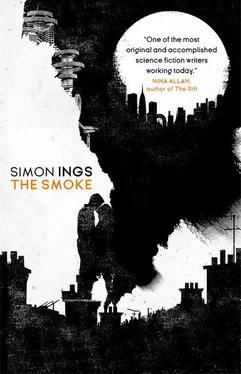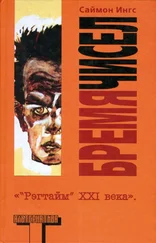I didn’t know about that. But I had lost too much of my mother already – to cancer, and to Stella – to ignore altogether this strange new chapter in her life. Though I was sceptical about who or what I would find rattling the gaily painted bars of Stella’s newly installed stairgate, I felt I had better stake an early interest.
I arrived to find Betty in Stella’s basement dining room, strapped in a high chair, splashing sickly, sweet-smelling rusk porridge all over the zinc dining table. Now Betty was out of Ladywell’s care, Stella had to rely on local shops for her supplies. Betty’s stiff plastic bib had a locomotive on it. Her sippy cup was embossed with cartoon giraffes.
‘Here she is,’ Stella said, tone cheery, eyes wide as she faced me and nervous as hell. I wondered if her mood was triggered by my arrival. It was just as likely that Betty herself was keeping her on a constant knife’s edge.
Her feeding, for a start, was painful to watch. An ordinary baby, knowing no better and anyway lacking coordination, will throw porridge around as a kind of wild experiment. The infant before me, however, already knew perfectly well what a spoon was, what a table was, what up and down were and what porridge was for. She just lacked the coordination to handle them. There was no joy in her movements at all – just incapacity. She looked to me to be exactly what she was: a shrunken adult struggling with a motor dysfunction. She glared up at me, her chin thrust belligerently forward and dripping with milky, greyish stuff. She dropped her wide-grip plastic spoon. It fell half into her bowl and toppled out onto the table. She weaved her stubby little arms in front of her face.
Stella translated: ‘She wants to know what took you so long.’
Fel was in the kitchen, wringing out a rag. She returned to wipe up the worst of the spills and detach Betty’s bib. Betty sat still throughout the clean-up. No actual baby would ever have done that. I tried hard not to show my discomfort, but I found it very difficult to watch. I felt I was confronted with something pretending to be a baby. Which, I suppose, was not far from the truth. The imposture was more than unsettling. It was disgusting. My whole body sang with tension. It occurred to me that it would be the most natural thing in the world for me to stove this thing’s head in with a pan. The shock was so intense, I mumbled an excuse, rushed into the kitchen and leaned over the sink. There was a glass on the drainer and I fumbled it under the tap and filled it. The drink helped. Thank God that’s over , I thought. My heart steadied. I came back in to find Fel wiping Betty’s face with a damp tissue, and it was all I could do not to rush in and save her, pulling her out of range of that dangerous, gummy mouth and those tiny, stubby, grasping hands.
They weaved about.
Stella, translating again, said: ‘She wants to know about your work.’
So I sat there sipping milky coffee, trying to control the trembling of my hands, trying to explain to my newborn mother how the kinds of technology that (among other things) made her possible were eating my career before my eyes. ‘They print buildings now, Mum. Draw and print. The machines do everything.’
Whatever sign-system Betty was using, it had to be tiring, and she was constantly trying to form words in the back of her throat, her immature tongue weaving around inside her gaping mouth like something trapped. I tried to ask her about herself, about what she was going through and how she felt. She waved these questions away impatiently. Replying to them with arm gestures would have been both difficult and exhausting – even assuming that Stella was up to translating them.
Fel steered away from us as we talked; over Betty’s head I could see her busying herself in the kitchen, sorting out piles of baby clothes. Georgy Chernoy was not at home. I wondered what he made of these novel domestic arrangements: about being confronted, at the end of every busy day, with a living, breathing, defecating example of his creation.
In the taxi back to the Barbican, Fel said, ‘What do you think about kids?’
‘She’s not a kid,’ I replied. ‘I don’t know what she is. Well, I do. I get it. She’s something new. Still, I don’t know how you do it. They grow up fast, don’t they? Faster than normal. That’s what I’ve read. I can’t imagine Dad coping with this. Not until she’s older, anyway. Not until she can speak, at very least. How long will we have to wait? A couple of months? She’s developing so fast.’
I looked across at Fel. She was looking out of the window, away from me. Her arms were folded.
‘What’s the matter?’
She took a sudden interest in something outside, though there was nothing to see.
Eventually, she said: ‘You didn’t answer my question.’
* * *
In the game of Set there are no turns. The dealer shuffles a special deck and lays twelve cards face up in a rectangle. Players identify and remove sets of three cards from anywhere in the array. Each card contains one, two or three symbols, which are lozenges, squiggles or diamonds, and these are either red, green or purple, and solid, open or striped. There are 81 cards in the box, and there is a 1:33 chance of there being no set present in an array of twelve cards.
‘Set!’ Stan Lesniak exclaimed.
‘No.’ Fel pointed to two of his cards. ‘These two are diamonds. That one is a lozenge.’
He still didn’t understand.
‘You can’t have two characteristics the same,’ Fel explained, ‘unless all three are the same.’
Stan blew a raspberry. ‘This is boring,’ he complained. ‘Have you at least got some better wine?’
Stan, star of my academic year, editor of Responses , was following my brother to Woomera, albeit in the employ of the Commonwealth Office. For years the army had been detonating atom bombs in tarmac-lined hemispherical basins dug all over the desert. It was the quickest way they knew of producing the valuable, short-lived nuclear fuel called tritium. Now local campaigners were blaming the production cycle for an increase in stillbirths, birth defects and childhood leukaemias. Stan had been hired to establish whether these claims had any scientific credibility.
‘You would have thought, when they heard the loud bangs, people would simply have had the sense to move away,’ he complained. He sipped at what I’d just poured him and winced.
‘Stan’s a sensitive soul,’ I said for Fel’s benefit, trying to keep the evening light.
But Stan was caught in an embarrassing position and, being Stan, wanted to take his embarrassment out on us. Somehow he had heard about Betty – I don’t know how – and he must have assumed Fel and I were looking after her. He was irritated to find that Betty was not with us when he visited; worse, that neither Fel nor I wanted to share parenting stories with him. He insisted on staying in the flat though, even though we had a restaurant table booked, and then he acted all put out that our home life was boring. Well, whose isn’t? ‘What do you do all day here, anyway?’
It was a good question, though not one I had any intention of discussing with him.
* * *
What did we do all day here?
Listlessly, and without much conviction, I revised for my finals, which were now only a month away. I had been a conscientious student. I knew I would pass. I knew, with equal conviction, that I would not excel. For all my brave words in Art’s defence around Stella’s dining table, I was not very creative. I had learned how to use rulers and protractors. I had learned how to project a three-dimensional structure onto a piece of graph paper. I had learned how to turn sketches into lists of materials and plans of work. I had, over three years, acquired competence in the very skills that were even now being automated by the Bund.
Читать дальше












